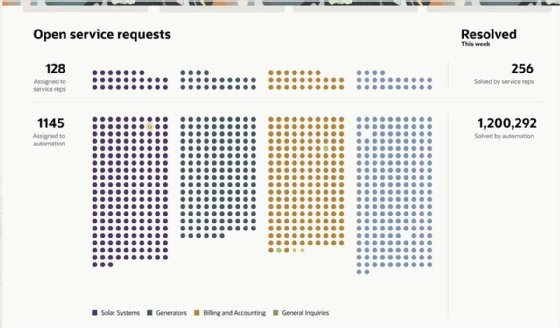
sdecoret - stock.adobe.com
Oracle Service platform adds autonomous AI agents
Oracle adds a number of agents and dashboards to Oracle Service and Field Service as the company strives to provide users with capabilities that enable 100% AI autonomy.
With autonomous agents released for Oracle Fusion Cloud Service, the company has taken on the quest to enable customer service 100% managed by autonomous bots.
Included in releases are generative AI-powered agents that can perform tasks such as crafting contact center and field service call and chat summaries, routing field service calls and crafting field service knowledge summaries. They can also develop action plans to solve problems for both the contact center and field service agents.
Also in the new release is a dashboard that tracks how many tickets -- and in which topic buckets -- were resolved by autonomous agents vs. humans.
Oracle competitors Zendesk and Salesforce also released or previewed autonomous agent technologies in the last month.
While autonomous agents have the potential to upend service as we know it, it takes a lot more than a customer service platform to reach that goal of fully automated processes, said Predrag Jakovljevic, an analyst at Technology Evaluation Centers.
"[For example,] you can be happy with a technician fixing a problem, but if they bill you wrongly because of an ERP issue, you will still be unhappy," Jakovljevic said. "Or, if a part is not available because of a supply chain management issue, even if the human technician is fine, again, you are unhappy."
Oracle and its subsidiary NetSuite, along with Microsoft, SAP and IFS are probably the only technology vendors in position to accomplish all of the above, Jakovljevic said.

Youngsters drive service tech changes
Jeff Wartgow, Oracle vice president of Service and CX product management, said the idea behind the current wave of technology releases is to change customer service to meet the needs of the Millennial, Gen Z and Gen Alpha "iPad babies."
In general, those generations -- which will soon make up the majority of the workforce -- prefer to iron out service issues quickly with bots rather than speak with a live agent, he said. This means B2B customer service organizations that are call-first are investing in unsustainable processes customers will no longer want.
"We believe that the automation is going to build trust with the customers -- that it's going to resolve problems simple or complex, it's going to accommodate the modern customer's needs [in the manner] they want to be served and how they want to engage with their brands," Wartgow said.
"Does that mean the service organization is going away? Absolutely not." When all service interactions are covered by bots, or at least a grand majority, roles in the service organization will change to designing, optimizing and updating service workflows, Wartgow said.
Don Fluckinger is a senior news writer for TechTarget Editorial. He covers customer experience, digital experience management and end-user computing. Got a tip? Email him.







